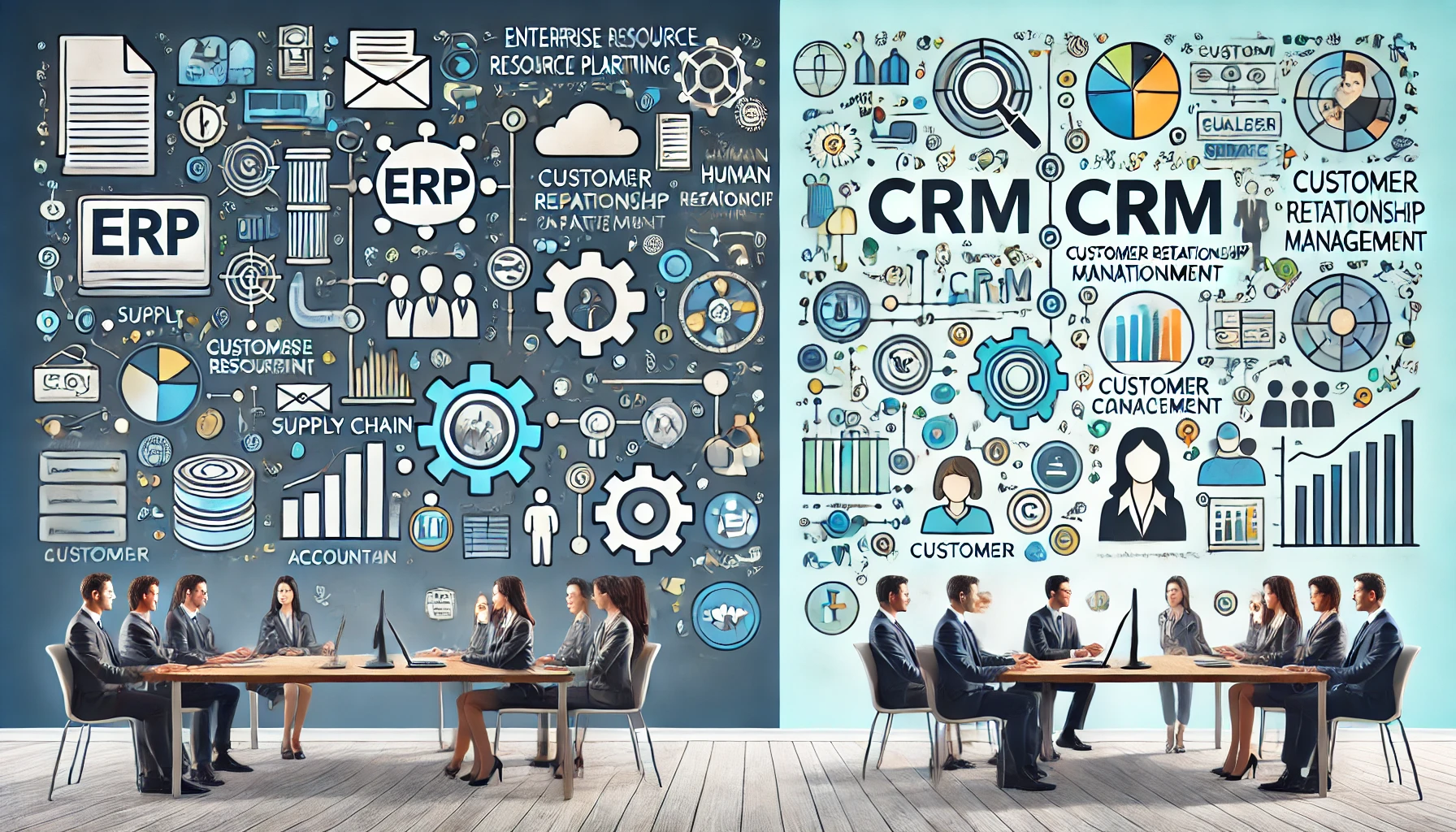Erp Vs. Crm: Which Software Is Right For Your Business?

In Today’S Competitive Business Environment, Organizations Rely On Advanced Technologies To Streamline Operations, Improve Customer Relationships, And Achieve Sustainable Growth. Two Of The Most Powerful Tools For These Purposes Are Enterprise Resource Planning (Erp) And Customer Relationship Management (Crm) Software. But How Do You Decide Which One Is The Right Fit For Your Business?
This Blog Explores The Differences Between Erp And Crm Systems, Their Core Features, And How To Choose The Best Solution Based On Your Business Needs.
Understanding Erp And Crm
What Is Erp?
Enterprise Resource Planning (Erp) Is A Comprehensive Software Solution That Integrates Various Business Processes Into A Centralized System. Its Primary Goal Is To Improve Efficiency And Provide A Real-Time View Of Your Organization’S Operations.
Core Functions Of Erp:
• Accounting And Finance: Streamlines Financial Reporting, Budgeting, And Payroll Processes.
• Supply Chain Management: Manages Inventory, Procurement, And Logistics.
• Human Resources: Tracks Employee Information, Attendance, And Payroll.
• Production And Operations: Optimizes Manufacturing And Operational Workflows.
Industries Using Erp:
Manufacturing, Retail, Healthcare, Logistics, And Large-Scale Enterprises Often Rely On Erp Systems To Manage Their Complex Operations.
What Is Crm?
Customer Relationship Management (Crm) Software Is Designed To Help Businesses Manage Their Interactions With Current And Potential Customers. It Focuses On Improving Customer Satisfaction, Driving Sales, And Retaining Clients.
Core Functions Of Crm:
• Lead Management: Tracks Potential Customers And Sales Opportunities.
• Customer Service: Ensures Personalized Support And Issue Resolution.
• Marketing Automation: Helps With Campaign Management, Email Marketing, And Analytics.
• Sales Tracking: Monitors Sales Performance And Customer Purchase History.
Industries Using Crm:
Crm Systems Are Widely Used By Sales-Driven Industries Like Retail, Financial Services, Real Estate, And Hospitality.
Pros And Cons Of Erp
Advantages Of Erp:
1. Centralized System: Integrates Multiple Business Functions Into One Platform.
2. Improved Productivity: Automates Repetitive Tasks, Saving Time And Reducing Errors.
3. Data Accuracy: Provides Real-Time Data For Informed Decision-Making.
4. Scalability: Can Grow Alongside Your Business.
Disadvantages Of Erp:
1. High Cost: Erp Systems Often Involve Significant Upfront Investment.
2. Complex Implementation: Requires Time, Resources, And Expertise For Deployment.
3. Customization Challenges: May Need Extensive Customization To Fit Industry-Specific Needs.
Pros And Cons Of Crm
Advantages Of Crm:
1. Enhanced Customer Relationships: Helps Build Long-Lasting Connections With Customers.
2. Improved Sales Performance: Tracks And Analyzes Sales Activities To Boost Revenue.
3. Easy-To-Use Interface: Designed For User-Friendliness, Especially For Non-Technical Teams.
4. Affordable Options: Many Crms Are Available At Competitive Prices For Small Businesses.
Disadvantages Of Crm:
1. Limited Scope: Focuses Solely On Customer-Facing Activities.
2. Data Overload: Can Be Overwhelming If Not Properly Managed.
3. Integration Issues: May Need Integration With Other Tools For Full Functionality.
When To Choose Erp?
Erp Systems Are Ideal For Businesses That:
• Have Complex Operations Involving Supply Chain, Production, Or Logistics.
• Need A Unified Platform To Manage Multiple Departments.
• Want To Improve Internal Efficiency And Reduce Operational Costs.
• Operate In Industries Like Manufacturing, Retail, Or Healthcare.
Popular Erp Solutions:
• Sap Erp
• Oracle Netsuite
• Microsoft Dynamics 365 Erp
• Odoo
When To Choose Crm?
Crm Software Is Perfect For Businesses That:
• Focus On Building Strong Customer Relationships And Driving Sales.
• Require Tools To Manage Leads, Marketing Campaigns, And Customer Support.
• Operate In Customer-Facing Industries Like Real Estate, Hospitality, Or Retail.
Popular Crm Solutions:
• Salesforce
• Hubspot Crm
• Zoho Crm
• Pipedrive
Erp Vs. Crm: Can You Use Both?
While Erp And Crm Systems Serve Different Purposes, They Are Not Mutually Exclusive. In Fact, Integrating Both Systems Can Provide Your Business With The Best Of Both Worlds: Operational Efficiency And Enhanced Customer Engagement.
Benefits Of Combining Erp And Crm:
1. End-To-End Visibility: A Unified View Of Both Operational And Customer Data.
2. Improved Collaboration: Teams Across Departments Can Work More Cohesively.
3. Enhanced Decision-Making: Access To Comprehensive Business Insights.
4. Increased Scalability: A Solid Foundation For Future Growth.
Examples Of Erp-Crm Integration:
• Microsoft Dynamics 365 Offers Combined Erp And Crm Capabilities.
• Salesforce Can Be Integrated With Erp Systems Like Sap Or Netsuite.
Factors To Consider When Choosing Erp Or Crm
1. Business Goals:
• Erp: Choose If You Aim To Streamline Operations And Reduce Costs.
• Crm: Opt For Crm If Your Primary Goal Is To Boost Sales And Improve Customer Relationships.
2. Company Size:
• Small To Medium-Sized Businesses May Find Crm Solutions More Accessible.
• Large Enterprises Often Require Erp Systems To Manage Complex Operations.
3. Budget:
• Crms Are Generally More Affordable, While Erps Involve Higher Costs.
4. Industry Requirements:
• Manufacturing And Logistics Firms Typically Benefit From Erp.
• Sales-Driven Industries Thrive With Crm Solutions.
5. Implementation Time:
• Erp Systems Take Longer To Implement Due To Their Complexity.
• Crm Software Can Be Deployed Quickly And With Minimal Disruption.
Conclusion
Choosing Between Erp And Crm Depends On Your Business Priorities. If Your Focus Is On Improving Internal Processes And Achieving Operational Efficiency, Erp Is The Way To Go. However, If Customer Satisfaction And Sales Growth Are Your Top Priorities, Crm Should Be Your Choice.
For Businesses Looking To Maximize Their Potential, Integrating Both Erp And Crm Can Be A Game-Changer. It Allows You To Streamline Operations While Maintaining Strong Customer Relationships—A Winning Formula For Success In Any Industry.